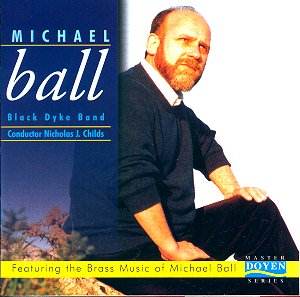Stylistically,
none of the works on this disc provide any real evidence of Ballís
studies during the early 1970s with Franco Donatoni in Italy,
nor of his attendance at the master classes of Ligeti and Berio
at around the same time. Rather, one assumes that during a period
away from composition in the mid to late 1970s a stylistic re-evaluation
took place. The emerging music is unashamedly melodic and approachable,
indeed "English" as the booklet notes point out.
The
musical weight of this disc is principally carried by Whitsun
Wakes, written by Ball in response to a BBC commission and
first performed by the Black Dyke Band during the BBC Music Live!
Festival, held at Bridgewater Hall, Manchester in May 1997. The
venue of the premiere was a fortuitous coincidence given the composerís
Mancunian roots coupled with the inspiration behind the piece,
the Wakes Week holiday of Ballís youth. This was when Lancashire
factories would shut down and families traditionally packed their
suitcases and departed for their annual seaside holiday.
In
Whitsun Wakes Ball has fortunately managed to avoid falling
into the trap that has afflicted so many other "test pieces"
of recent vintage, namely the compromise of the music itself in
favour of sheer technical difficulty. Not that the piece is a
virtuosic stroll Ė far from it. As well as the technical challenges
there are contrasting sections of sheer fun, genuine melodic beauty,
gloriously rich and haunting sonorities and even a few hymn tunes,
a reference to the church processional parades that were the origins
of the Whit holidays. Much of the success of the work is in the
fact that Ball has skilfully packed a great deal of incident into
sixteen minutes without the feeling that the piece has become
"overcrowded".
In
comparison the other works somewhat fail to live up to expectation,
the notable exception being the shortest piece, Cortege,
a heartfelt elegy in memory of Herbert Howells with whom Ball
studied at the Royal College of Music. The harmonic and melodic
similes that Ball weaves into his music are both clear and poignant
and the solo cornet part (Ball originally wrote it for the flugel
horn player Mark Walters) is here beautifully performed by Roger
Webster.
The
title of Midsummer Music (Sonata for Brass) is derived
from ĎA Midsummer Nightís Dreamí although conforms to a classical
sonata in structure whilst Chaucerís Tunes was originally
scored for wind band and is effectively a suite of six continuously
played sections that can also be played individually with alternative
endings. Both pieces, whilst melodically attractive enough, are
ultimately unremarkable. The light hearted Cambrian Suite
and English Suite on the other hand are unpretentious yet
enjoyable, the former utilising the tunes Men of Harlech,
Cradle Song and The Rising of the Lark, with An
English Suite being loosely modelled on Holstís A Moorside
Suite, hence the opening Scherzo and Nocturne. Both of these
pieces have been used as test pieces in youth band championships
and no doubt their sunny character will ensure their continued
success in this sphere.
The
Black Dyke Band are on splendid form under the able direction
of Nicholas Childs and it is their impressive performance of Whitsun
Wakes that ultimately makes this disc recommendable.
Christopher
Thomas.
